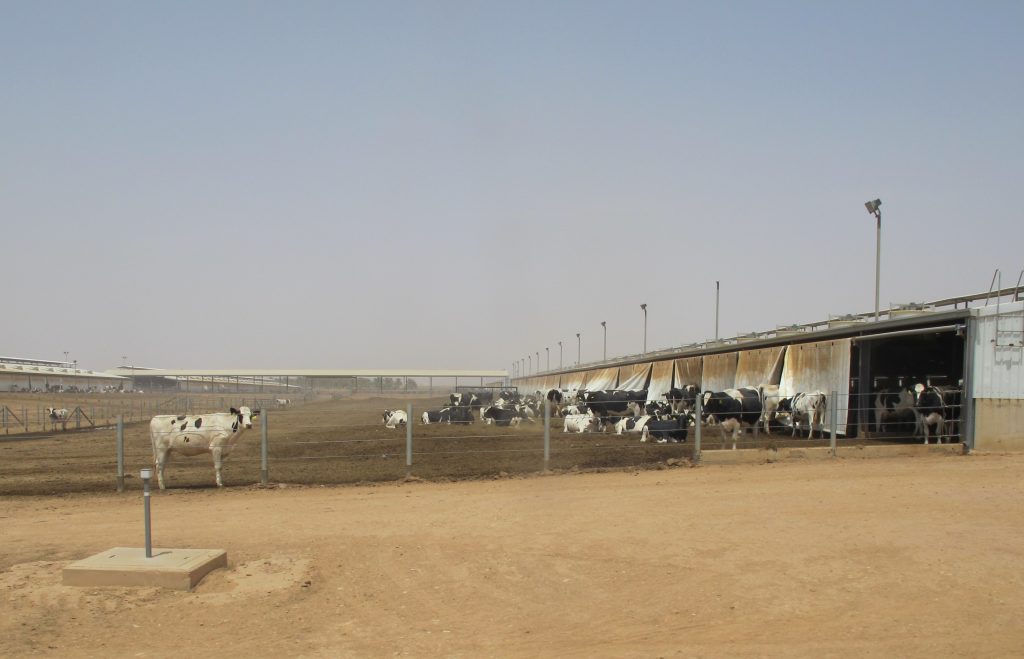São Paulo – Saudi Arabia has cleared the import of cattle and poultry genetic material from Brazil. A statement was relayed on Monday (26) by Saudi sanitary authorities to the Brazilian Ministry of Agriculture, Livestock and Supply (MAPA). Authorization has been given for the export of hatching eggs, day-old chicks, in vivo/in vitro cattle embryos, and cattle semen.
Sanitary talks began in the second half of 2017, as the Brazilian Agriculture Ministry joined forces with local industry players to look into different markets. They ascertained that the materials at hand could potentially be sold to Saudi Arabia. Pictured at the top of this story is a Saudi dairy farm.
The Saudi Ministry of Environment, Water and Agriculture (MEWA) approved Brazil’s draft International Animal Health Certificates (CZI) for cattle and poultry genetic material, outlined by the Agriculture Ministry’s Animal Health Department (DSA). In October, the Brazilian Ministry’s Agricultural Defense secretary Luís Rangel led a technical mission to Saudi Arabia alongside DSA director Guilherme Marques. This helped unlock talks with Arab authorities.
“In our estimation, 2019 should see exports of cattle genetic material to Arab countries increase by 30%,” Arab Brazilian Chamber of Commerce interim CEO Tamer Mansour said. He also said that in reaching this milestone, Brazil is becoming a pioneer country in genetic technology. According to Mansour, the Saudi government’s approval of the certificates is a display of trust in Brazil’s sanitary surveillance system, and an indication that the Saudi and Brazilian governments “are on the same page.”
Saudi Arabia is the second biggest importer of poultry from Brazil, and already a buyer of hatching eggs. As for beef, it is Brazil’s seventh biggest client, as per numbers spanning January to October, 2018. “Technical cooperation of this kind incrementally add to partnerships between governments and private sector players, thereby making Brazil a strategic partner in Brazilian-Saudi relations, rather than a mere exporter,” Mansour concluded. Last week, Saudi Arabia had cleared the import of honey and honey-based products from Brazil.
Brazilian cattle genetic material is already being sold to the United Arab Emirates and Egypt. Saudi Arabia is the third Arab country to join in. Brazilian Zebu Cattle Breeders Association (ABCZ) international relations manager Icce Garbellini said the bulk of cattle genetics exports from Brazil go to countries in Latin America, like Colombia, Panama and Paraguay.
“ABCZ has been assisting the MAPA in negotiations for approval of sanitary protocols in several countries, and Saudi Arabia was one of them,” said Garbellini. The manager said that the genetic material can be used in breeding both beef and dairy cattle, depending on farmer demand. “The Arab countries have great potential and we are negotiating with other countries in the Middle East and North Africa,” he said.
Brazilian poultry genetic material is exported to over 50 countries in the Americas, Middle East, Africa, Europe and Asia. As for Arab countries, Saudi Arabia now becomes part of a list that includes Sudan, Oman and the UAE, according to the Brazilian Animal Protein Association (ABPA)’s 2018 annual report, which brings export data from 2017.
The number of markets importing day-old chicks and hatching eggs from Brazil has been growing in the last few years. According to Guilherme Marques, one of the main factors for gaining new markets was the international recognition of the sanitary conditions of local poultry – Brazil has never seen a case of bird flu. According to the MAPA’s statement, Marques also mentioned “the level of biosecurity implemented by the producers of Brazilian genetics, the poultry lines and the transfer of features that allow for the development of products with quality and productivity.”
According to the MAPA’s statement, Brazil has been increasing the number of importing markets of in vivo (hormone stimulation of the ovaries of a donor cow to induce the development and maturation of several follicles at once) bovine embryos, in vitro embryos (maturation and fertilization in vitro of oocytes produced in the ovaries, taken from heifers or cows) and bovine semen. Marques attributed the sector’s growth to the sanitary improvements seen in the last few decades, and highlighted Brazil’s recognition by the World Organisation for Animal Health (OIE), in May, as a foot-and-mouth-free country with the use of vaccination.
The director also mentioned the genetic improvement of taurine and zebu breeds, the consolidation of the production and transfer of in vivo embryos, and the growing use of in vitro fertilization, plus investments in technology and biosecurity by semen and embryo collection centers, in a bid to meet international requirements.
In a written statement, Brazil’s Agriculture minister Blairo Maggi underscored the relevance of Saudi Arabia as a trade partner of Brazil’s – it imported over USD 2.6 billion worth of Brazilian goods in 2017, over USD 1 billion of which was chicken meat. Maggi pointed out that entering new markets helps to diversify trade and paves the way for the country to reach its target of achieving a 10% share of the global agricultural products market.
Translated by Gabriel Pomerancblum and Sérgio Kakitani




